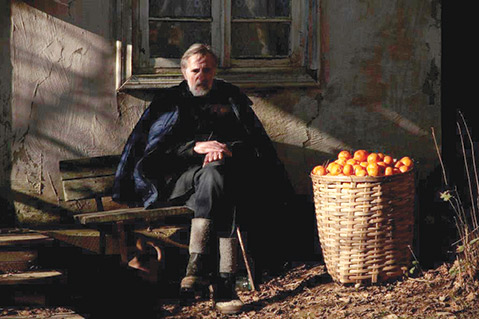Tangerines
Director Ivo Felt

War seems constant in many parts of the Caucasus Mountains, where the culture of the West collides with that of the East. Nowhere is this truer than in the region of Abkhazia, the disputed region of northeastern Georgia that Russian-backed separatists took control of many years ago. This thought-provoking and downright excellent film enters that era, showing how two Estonian men — their own ethnic role in the region an entirely interesting piece of forgotten history — bring a Georgian soldier and Chechen mercenary who shot each other back to health under the same roof.
See allfilm.ee.
What inspired you to tell this story?
When I heard about the Estonian villages in Abkhazia, I immediately thought it would give me the nice possibility to tell a very human and pacific story through this historical fact. I’d been thinking about making the film on this totally senseless war in Abkhazia for awhile already and when an Estonian developing producer turned to me with an offer to shoot one, I was happy that I found the intriguing way to make it. It is a very human drama, I hope — it is funny and sad as one’s life is.
Why were Estonians living in the Caucasus anyway?
They moved there on the second half of 19th century, when the Russian czar wanted to liven up agriculture on shore of the Black Sea. Estonians are hardworking people and they managed very well in Abkhazia. The climate is much nicer there than up north where they are originally from, so they liked it very much and stayed for many generations until this bloody war broke out. The Estonian president of those days, Lennart Meri, was calling them to Estonia before the actual fights would reach their villages and almost everybody left their homes, where they were living for many generations. They were farmers, not only of citrus, but also other products were cultivated by them.
What were the challenges of filming there?
As the result of this 1992-93 war, Georgia lost this beautiful part of the country and this is Russia-controlled Abkhazian Republic now, officially recognized by Russia and North Korea only. So we were not able to shoot there and we set it up in Guria, the region of Georgia, not very far from Abkhazia. The challenges we had were just about filmmaking, nothing else. Still we needed to work hard to make our set look like Estonian village in Abkhazia, we built the houses, made up the roads, even took three palm trees and planted them on the set. This was quite a bit of the work.
How has the film been received in Georgia and the neighboring territories?
The film was a real hit in both producing countries, Estonia and Georgia — it went very, very well there. Now, after the Golden Globe and Oscars nomination, we are like heroes in our small countries — a very weird situation, but nice, of course. The film runs in Estonian cinemas again, and the audience goes to see it again — quite a beautiful fact, as it was originally released more than a year ago already.
Are people in the region becoming averse to the fighting, or are they still very much entrenched?
There is no actual war in the region at the moment, still the atmosphere is quite tense. Just a few days ago there were two people killed on the border of Abkhazia again.
What do you hope the wide world learns from this film?
Live in peace, wars are senseless — this is our message. We are not that naive that we think our film would change the world, but at least we know we have done something against these insane things. Making films is our weapon and we are using this as well as we can.



